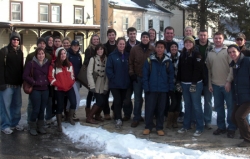Civil Engineering Seniors Partner with PennDOT

Students in the Civil Engineering Senior Transportation Capstone course are working to transform the Coatesville, Pa., Amtrak train station and its surrounding area. Their project is part of an initiative to bring high-speed rail to Pennsylvania and upgrade Amtrak’s Keystone Line. In an effort to promote the use of public transportation and generate revenue in the community, students will create design plans for the development of the station’s growth.
The class is partnering with the Pennsylvania Department of Transportation (PennDOT) and Amtrak to generate creative and pragmatic ideas to solve this real-world problem. Five teams will develop design solutions for railway, road, and context-sensitive designs, as well as land development, mobility, parking, and security concerns. They are challenged to remain considerate of the community’s needs while also thinking about political ramifications and the most efficient use of space. They must also follow recommendations in line with PennDOT’s budgetary parameters.
So far, the group has visited the train station; met with PennDOT, Chester County, and the City of Coatesville officials; and attended lectures on topics specific to the scope of their work. The students were also invited to an open forum in the community to ask questions, hear directly from the city planners and PennDOT design team, and learn more about the project.
“They got a hands-on and first-hand view of the engineering and social challenges involved with renovating both the station and the area around it. This experience is priceless. We also strive to provide some networking opportunities for our seniors, as they look forward to their careers after graduation in May,” says Dr. Leslie McCarthy, P.E., Assistant Professor of Civil and Environmental Engineering who specializes in transportation engineering.
Their project will culminate with a formal, written report and a 20 minute oral presentation during Civil and Environmental Engineering Day. The team will deliver their presentation as if they were members of an engineering firm meeting with a client to propose a plan.
“An important lesson that this project has taught us is the importance of communication between planners and engineers. They each have different perspectives and objectives when working on a project. It is up to the team to work together cohesively to accomplish both goals, without ignoring or stepping on the toes of the other,” says Margaret Carragher CE ‘11.
As the students fuse their communication and technical skills with the engineering tasks at hand, they work to contribute to the planning process in feasible, realistic ways. PennDOT and the engineering firm of Michael Baker & Associates plan to review the student groups’ designs at the end of the semester and may even incorporate some of their ideas into the official Request for Proposal, which will be released this summer.
